The escalating isolated incidents of violence between Israelis and Palestinians during the past few months have focused heavily on Jerusalem, and for good reason.
The reason is not only the religious significance of the Noble Sanctuary/Temple Mount area that is holy to both people; it is that Jerusalem today is a microcosm of the whole Zionism-Arabism conflict, and a replay of the nationalist contestation that Zionism won in the period from the 1930s to 1948.
Jerusalem today is more than a major symbol of identity and sovereignty for Israelis and Palestinians.
It is the place where all the key elements of conflict, identity and national rights converge in a place where the two battling communities are most closely intertwined with one another, thus heightening the sense of vulnerability that defines both sides.
Clashes between Israeli troops and Palestinian demonstrators occurred virtually daily in the past few months, and reached a peak last week after Israeli troops stormed Al Aqsa Mosque, last Wednesday.
On Monday, Palestinians killed an Israeli soldier and a woman, and injured two others in stabbing incidents in Tel Aviv and the occupied West Bank.
Jerusalem is the emotional focal point of the Palestinian attacks against Israelis, but such incidents occurred across Palestine, including Jerusalem, the West Bank Israeli settlement of Alon Shvut and Tel Aviv.
Jerusalem today for Palestinians is about the battle between Israel’s attempts to Judaise the city after formally “annexing” it (which virtually the whole world does not recognise) and the Palestinian insistence on resisting the Zionist efforts to control and own the land of mandated Palestine that have been taking place for nearly a century now.
Israeli settlers have been trying for years to move into Arab areas of Jerusalem, like Silwan and Sheikh Jarrah, either by buying houses surreptitiously or forcibly by inhabiting real estate that Israel declares to be state owned.
Because the Palestinian Authority and the Palestine Liberation Organisation (the two overlapping, moribund, Palestinian leadership agencies) are not present in Jerusalem, the Arab residents of the city are on their own in defending their homes and lands.
The absence of PA forces, under the control of President Mahmoud Abbas, also means that those forces cannot quell Palestinian demonstrations against Israel, as happens in all other parts of the West Bank, where PA forces more often than not act to defend Israel as much as to keep peace among Palestinians, unfortunately.
Arab Jerusalemites are essentially ungoverned and unrepresented politically, because they do not fall under Palestinian Authority and are underserved by an Israeli state that also keeps building new settlements on lands surrounding the holy city.
Because of living in a political vacuum, Palestinians in Jerusalem have only themselves to rely on to defend their lands and rights, and in cases of extreme threats and violence used against them, they resort to violence such as we are witnessing these days.
The intense symbolism of Jerusalem for Palestinians includes two dimensions: the holy sites of the Noble Sanctuary, especially the Dome of the Rock and Al Aqsa Mosque, but also the city as the capital of Palestine, even though a Palestinian state does not exist yet.
If Jerusalem is allowed to fall to Zionist colonialism and become fully Judaised, the entire Palestinian national cause would have been dealt a fatal blow.
Jerusalem has always been a central battle in the Arab war with Zionism — but for many Palestinians, it is now also the last battle.
Typically, Israeli leaders misinterpret the reasons the Palestinians defend themselves by attacking Israelis who are eating up the remaining Arab parts of Jerusalem.
Israeli Prime Minister Benjamin Netanyahu told parliament after the attacks against Israelis in Tel Aviv: “Terror... is being directed at all parts of the country for a simple reason: The terrorists, the inciters, want to drive us from everywhere. As far as they are concerned, we should not be in Jerusalem, Tel Aviv or anywhere.”
This brazen lie by Israel’s top leader reflects a widespread sentiment among Israelis and some Western Jews that Palestinians are violent anti-Jews who want to drive them all out of Israel and Palestine, and that the Palestinian leadership under Abbas incites ordinary Palestinians to attack and kill Israelis.
This is a bizarre thing for Israelis to say, after they have been directly negotiating with Abbas and Yasser Arafat before him, for 20 years now, to achieve a two-state solution that sees Israeli and Palestinian states living peacefully side by side.
The historic struggle for the land of Palestine now symbolically boils down to Israeli settlers and soldiers with guns, and Palestinian young men with knives, stones and cars, trying to kill, dominate or expel the other.
Latest News
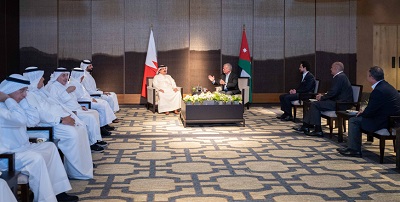 King, Bahrain monarch stress need to maintain Arab coordination
King, Bahrain monarch stress need to maintain Arab coordination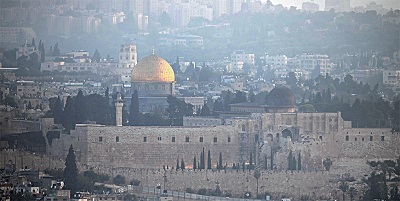 Security Council to vote Thursday on Palestinian state UN membership
Security Council to vote Thursday on Palestinian state UN membership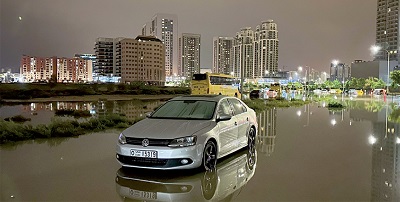 Dubai reels from floods chaos after record rains
Dubai reels from floods chaos after record rains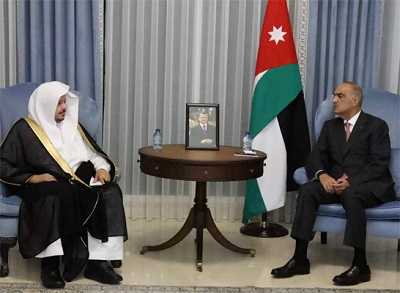 Khasawneh, Saudi Shura Council speaker discuss bilateral ties, regional developments
Khasawneh, Saudi Shura Council speaker discuss bilateral ties, regional developments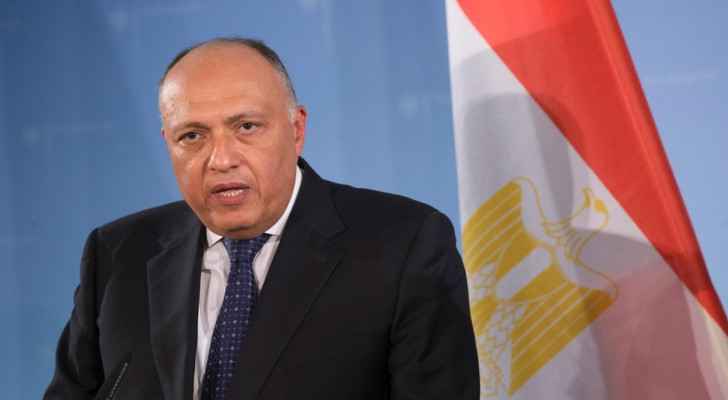 Egyptian Foreign Minister condemns potential Palestinian displacement as 'war crime'
Egyptian Foreign Minister condemns potential Palestinian displacement as 'war crime'
Most Read Articles
- Senate president, British ambassador discuss strategic partnership, regional stability
- Jordan urges UN to recognise Palestine as state
- JAF carries out seven more airdrops of aid into Gaza
- Temperatures to near 40 degree mark next week in Jordan
- Safadi, Iranian counterpart discuss war on Gaza, regional escalation
- UN chief warns Mideast on brink of ‘full-scale regional conflict’
- US vetoes Security Council resolution on full Palestinian UN membership
- Google fires 28 employees for protesting $1.2 billion cloud deal with “Israeli” army
- Biden urges Congress to pass 'pivotal' Ukraine, Israel war aid
- Israeli Occupation strike inside Iran responds to Tehran's provocation, reports say